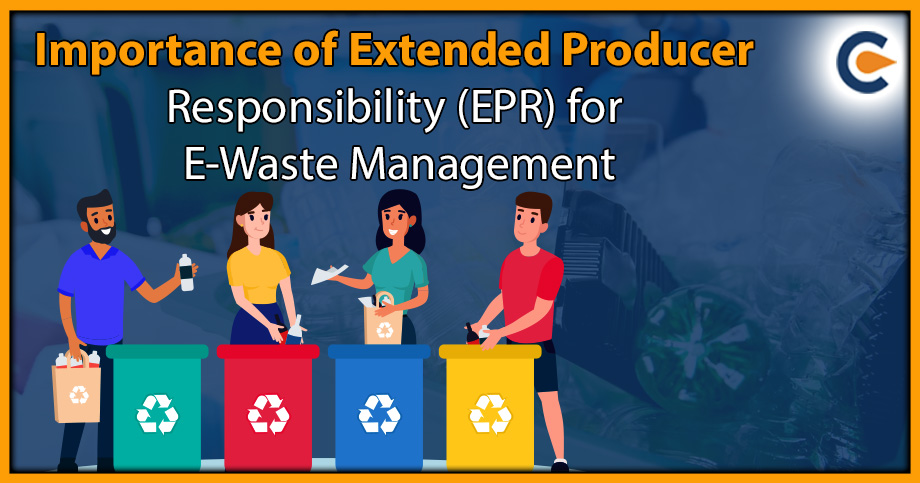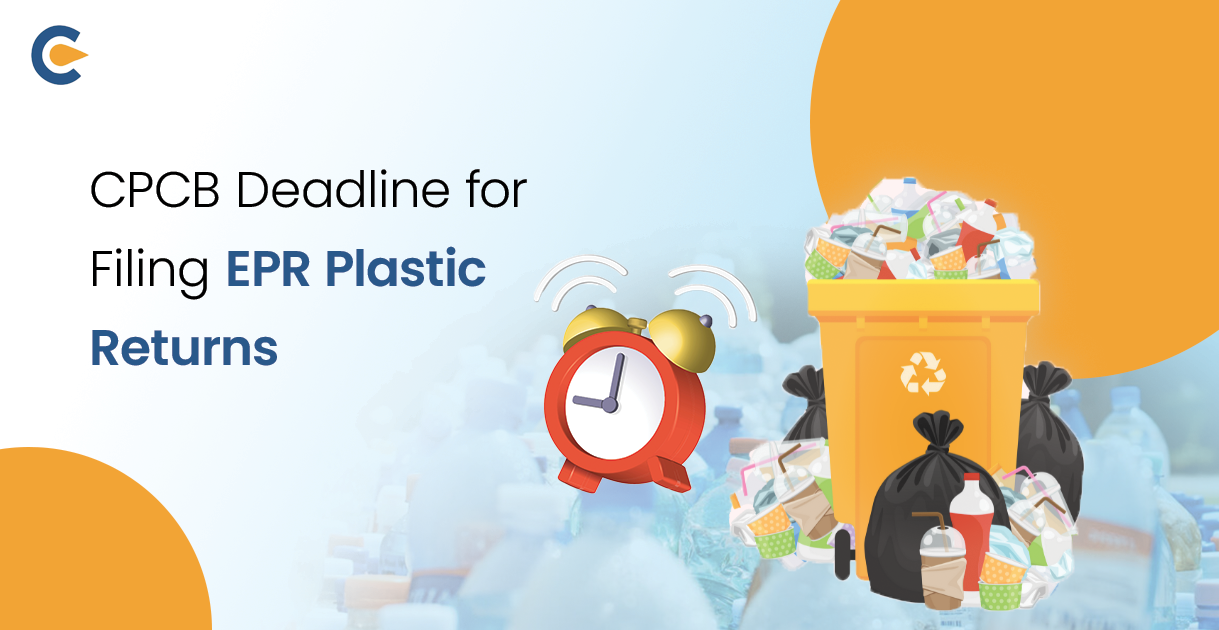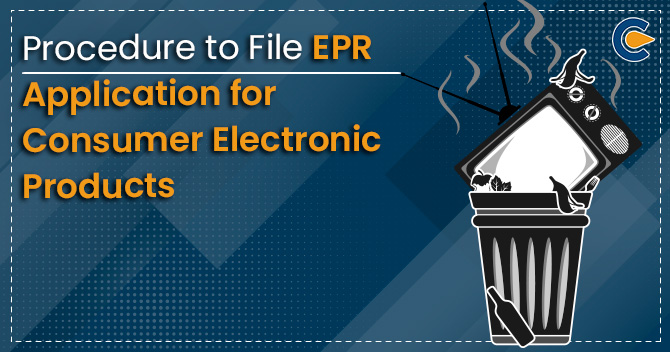EPR, which stands for Extended Producer Responsibility, is a government policy that places producers in charge of the treatment and disposal of consumer goods. Producers, importers, manufacturers, and brand owners must obtain EPR authorisation. EPR is a practice that incorporates environmental, economic, and social concerns. EPR is a policy concept that holds producers financially and physically accountable for the treatment and disposal of post-consumer items. In theory, delegating such authority might generate incentives to decrease source waste and thereby promote environmentally friendly product design and support waste management goals. The OECD is expanding EPR to encompass more products, product groups, and waste streams like electrical appliances and products.
Producers’ Extended Producer Responsibility (EPR) is governed by the grant of EPR Authorisation. Producers must apply to CPCB in Form 1 of the guidelines for EPR Authorization. This online E-Waste Management System allows application producers to apply for EPR Authorization online. The current EPR Application module is limited to online application submission and EPR Authorisation grant. All stakeholders, including producers, PROs, dismantlers, recyclers, and refurbishers, are obliged to register on this system. Producers, PROs, dismantlers, recyclers, and refurbishers add transporters and collection locations/centres to this system.
Producer in E-Waste Management
‘Producer’ refers to any person who manufactures and offers to sell electronic and electrical equipment and their components, consumables, parts, or spares under its own brand or offers to sell assembled electrical and electronic equipment and their components, consumables spares or , parts produced by other manufacturers or suppliers under its own brand or offers to sell assembled equipment.
In the subject of e-waste management, the circular economy undoubtedly promises a world of wonders. However, obstacles such as a lack of understanding and infrastructure implement the circular economy less common than expected. As a result, environmentalists and governments work together to implement EPR compliance for e-waste.
EPR, or Extended Producer Responsibility, is a method for environmental protection that aims to reduce the environmental impact of product waste, particularly electronic waste. According to India’s EPR regulations, makers and importers of electronic items are fully responsible for treating and disposing of consumer goods once their lifespan has expired. Furthermore, in order to reduce the growing amount of e-waste, entrepreneurs, manufacturers, and importers must register for an EPR licence.
Growing Threat of E-Waste in India
E-waste is an abbreviation for electronic waste. Every year, 50 million tonnes of e-waste are generated, according to statistics. That is, however, only the disclosed figure. Only 22.7% of the electronic waste generated in India is efficiently collected, deconstructed, processed, recycled, and disposed of. The leftovers are cluttering up trash yards and polluting the soil.
The statistics clearly demonstrate the importance of implementing strategic e-waste management because electronic waste contains toxic chemicals, heavy metals, glass, plastic, and harmful other substances such as cadmium, chromium, lead, nickel, and others. Leaving the dumped waste untreated is hazardous to the environment and human health.
The rapidly expanding volumes of electronic junk represent an increasing waste of finite natural resources. Untreated electronic waste is a significant concern to human health. Toxic chemicals and gases harm humans’ lungs, liver, respiratory system, and brain health. It also worsens conditions like cancer. As a result, it goes without saying that effective e-waste disposal and management are critical.
EPR Compliances for PIBOs of EEE
Producers and importers are required to collect, treat, and recycle a specified amount of electronic items generated in an ecologically friendly manner under EPR e-waste compliance.
- Manufacturers must guarantee that all electronic items are RoHS (Hazardous Substance Reduction)-compliant before they are released.
- To deal with and manage e-waste, manufacturers must only work with authorised recyclers and PROs (Producer Responsibility Organizations).
- Producers must appropriately label electronic equipment and offer advice on handling end-of-life products.
- EPR compliance for e-waste requires manufacturers, company owners, and importers to stock and dispose of devices that have reached the end lifecycle in authorised collection centres.
EPR compliance for e-waste exemplifies a cradle-to-cradle approach that includes collecting and channelizing end-of-life electronic products. The procedure is time-consuming and complicated. As a result, assistance and guidance from industry professionals are frequently sought.
Policies and Legislation with Extended Producer Responsibility
EPR was created in India to deal with e-waste. As a result, the central government decided to pass the E-waste Management Act of 2016.
- According to environmental guidelines, producers, importers, manufacturers, and brand owners are responsible for decreasing pollution caused by E-waste.
- Under Rule 13 (1) of the 2016 Rules, the Central Pollution Control Board is authorised to issue, renew, or refuse Extended Producer Responsibility (EPR).
- The Central Pollution Control Board (CPCB)[1] oversees enforcing EPR, which includes precise instructions for producers on channelising, recycling, storage, disassembly, and refurbishment.
Procedure of EPR Authorisation in India
Stage 1: File submission – Producers, importers, manufacturers, and brand owners must submit a file to the CPCB.
Stage 2: Verification – The Central Pollution Control Board (CPCB) or a state pollution control board may evaluate and investigate the given information within 25 days of receiving an application.
Stage 3: Grant of Authorisation – The Central Pollution Control Board or the State Pollution Control Board for EPR authorisation for E-waste gives the certificate of Authorisation after reviewing the submitted documentation and being satisfied with the extended producers’ responsibility plan.
Conclusion
Extended producer responsibility is a strategy for reducing planned extinction since it financially incentivises producers to design for recycling and build things that last longer. Governments may be relieved of the financial burden of paying for and managing waste by moving part of the cost responsibilities to the manufacturer and battling planned obsolesce. One of the significant benefits of EPR is that it becomes increasingly effective when countries that export E-waste are compelled to do so. Regulation of e-waste compels infrastructure to either cope with the trash or adopt new manufacturing methods. As more countries implement these measures, it becomes more difficult for others to ignore the issues. Waste accumulated at ports after China prohibited the import of E-waste from the United States; for example, the absence of infrastructure surrounding recycling E-waste in the United States has been possible due to the freedom to export and producers’ indifference. The growing weight of e-waste is pressing countries to build infrastructure and compelling local and federal governments to put additional rules on corporations.
Read Our Article: EPR (Extended Producer Responsibility) Policy India











